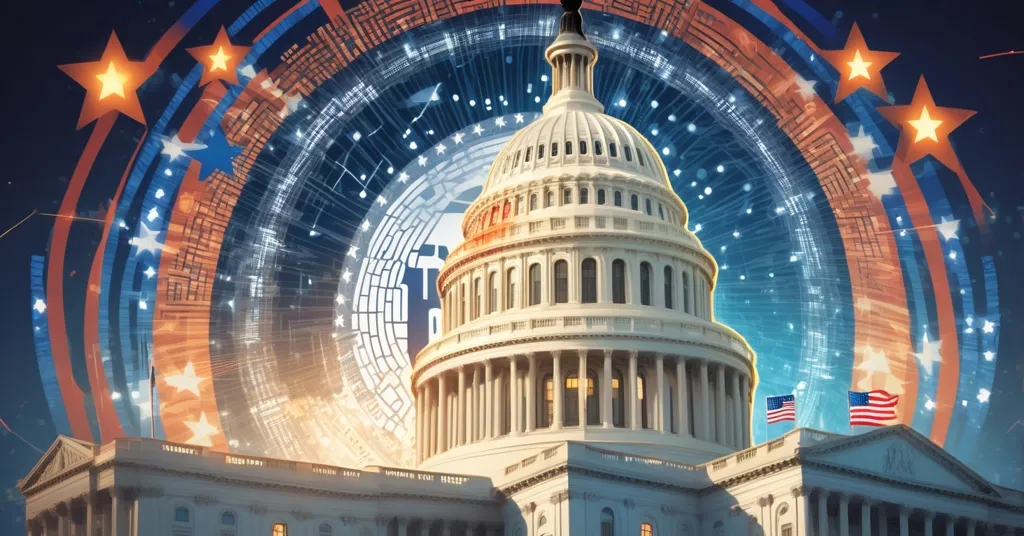Trump Backs $1B Bitcoin Reserve Bill: Lummis Unveils Major U.S. Crypto Push

US Bill for $1B Bitcoin Buy Gains Traction with Trump’s Backing, Lummis Reveals
Bitcoin has just scored a heavyweight endorsement that could reshape the financial future of the United States. At the Bitcoin 2025 Conference in Las Vegas, Senator Cynthia Lummis announced that President Donald Trump is throwing his full support behind her Strategic Bitcoin Reserve Act, also known as the “BITCOIN Act.” This ambitious bill proposes the U.S. government purchase one million bitcoins over five years, positioning Bitcoin as a national reserve asset akin to gold.
- Trump’s Support: President Trump backs the BITCOIN Act, with a White House team dedicated to digital assets.
- State-Level Action: Texas, Arizona, and New Hampshire have passed Bitcoin reserve bills in 2025.
- Global Momentum: The UAE is investing in Bitcoin via U.S. ETFs, while 30 states consider similar reserves.
A Federal Push for Bitcoin Dominance
First introduced in July 2024 without gaining traction, the BITCOIN Act was reintroduced in March 2025 with a renewed sense of purpose. Lummis made it clear during her conference speech at the Bitcoin 2025 Conference in Las Vegas that Trump’s endorsement is more than just a political gesture. A specialized White House team is actively shaping policies on a range of digital assets, from Bitcoin reserves to stablecoins—cryptocurrencies pegged to stable assets like the U.S. dollar, such as USDT or USDC, used to minimize price volatility—and broader market structures. This signals a seismic shift: the administration views cryptocurrency not as a fringe experiment but as a cornerstone of future financial strategy.
“President Trump supports the bill. And he has a team in the White House working on digital assets — everything from stablecoins to market structure to Bitcoin Strategic Reserve,” said Senator Lummis.
The core idea of the Strategic Bitcoin Reserve Act is to treat Bitcoin as a strategic hedge against inflation and economic instability, much like gold has functioned for centuries. The plan is designed to be “budget-neutral,” meaning it would repurpose existing Federal Reserve and Treasury funds without increasing government spending or burdening taxpayers. If enacted, the U.S. would hold roughly 5% of Bitcoin’s total supply—given its hard-coded 21 million coin cap—over the next five years. At mid-2025 price estimates of around $100,000 per BTC, that’s a $100 billion commitment. But let’s not kid ourselves: with Bitcoin’s notorious price swings, that figure could balloon or crater in a matter of weeks, a reality that skeptics will undoubtedly hammer on.
States Leading the Charge on Bitcoin Reserves
While federal action brews, states are not sitting idly by. Texas, Arizona, and New Hampshire have already passed their own Strategic Bitcoin Reserve bills in 2025, setting a powerful precedent. New Hampshire became the first state to enact such a law on May 7, 2025, while Texas Senate Bill 21, passed on May 21, awaits Governor Greg Abbott’s signature within a 10-day window, or it becomes law by default. The Texas legislation is particularly robust, mandating secure “cold storage”—offline storage of private keys to prevent hacks—and requiring any crypto asset the state invests in to have a market cap of at least $500 billion, a threshold that essentially points straight to Bitcoin, currently sitting at over $2 trillion in market cap.
“So you have Arizona, Texas and New Hampshire that passed Strategic Bitcoin Reserve bills this year,” Lummis noted.
Beyond these trailblazers, Lummis highlighted that 30 U.S. states are exploring similar Bitcoin reserve initiatives at the state level. This bottom-up momentum could be the real game-changer, turning states into proving grounds for crypto policy. If Texas or New Hampshire can demonstrate that a state-run Bitcoin reserve strengthens financial resilience—say, by offsetting inflation or diversifying assets—Washington’s hesitation might start looking like a costly misstep. These state-level experiments are a textbook case of the decentralized innovation we root for, showing that change doesn’t always have to trickle down from the top.
Global Trends and Geopolitical Stakes
The push for Bitcoin reserves isn’t just a domestic affair. Lummis pointed out that the United Arab Emirates is actively purchasing Bitcoin through American exchange-traded funds (ETFs), a move that benefits U.S. markets but also underscores the urgency for the U.S. to lead. This international interest positions Bitcoin as a geopolitical asset, not unlike oil or gold in past decades. If foreign nations are betting big on Bitcoin, can the U.S. afford to sit on the sidelines? For deeper insights into the policy implications, check out this Reddit discussion on the U.S. Bitcoin Reserve bill.
“30 states consider Strategic Bitcoin Reserves. We have the United Arab Emirates purchasing Bitcoin through American exchange traded funds — that’s good for America,” Lummis added.
Senators Marsha Blackburn and Jim Justice, also speaking at the conference, framed the stakes in stark terms. Blackburn emphasized that U.S. leadership in crypto could ripple out to allies, much like the dollar’s dominance shapes global trade today. Justice took a ground-level view, arguing that legislation will only accelerate when Bitcoin becomes a daily tool—think paying for coffee or groceries with BTC—for the average person.
“Many of our allies follow what we do. Everybody wants to be a part of our market, they want to be a part of our trade. And they will follow what we do,” said Senator Blackburn.
“When the average, everyday person is using Bitcoin to purchase their necessities… legislation will start happening at light speed,” remarked Senator Jim Justice.
Challenges and Criticisms Loom Large
Before we pop the champagne, let’s face the ugly truth: a national Bitcoin reserve is a gamble with plenty of pitfalls. Bitcoin’s price volatility—often swinging 10-20% in a single week—makes it a shaky foundation for a government reserve. Critics will argue it’s sheer lunacy to tie national financial strategy to a decentralized asset with no central control, especially when a single hacked wallet or lost private key could wipe out billions. Remember the 2014 Mt. Gox disaster, where 850,000 BTC vanished due to poor security? Scale that to a national reserve, and you’ve got a cybersecurity nightmare.
Then there’s the environmental angle, a persistent thorn in Bitcoin’s side. Mining Bitcoin consumes energy on a scale rivaling small countries, with annual estimates pegging it at over 100 terawatt-hours. While innovations like renewable-powered mining farms are gaining traction, the carbon footprint remains a sticking point for policymakers wary of public backlash. Add to that fears of market manipulation—if the U.S. holds 5% of Bitcoin’s supply, couldn’t its buying or selling moves tank or spike the price?—and you’ve got a recipe for heated congressional debates.
Regulatory hurdles also loom. Despite Trump’s backing, bipartisan support isn’t a slam dunk. Competing priorities, like the GENIUS Act for stablecoin regulation—which passed a key Senate vote on May 19, 2025—might steal the spotlight. Stablecoins, dominating a $250 billion market, are seen as a way to extend the dollar’s global reserve status, a safer bet for many lawmakers compared to Bitcoin’s wild west vibe. This tension between centralized and decentralized finance could slow the progress of the bill, even with significant support from Donald Trump on Bitcoin Reserve policy.
What If the BITCOIN Act Passes?
Let’s speculate for a moment. If the BITCOIN Act becomes law, the ripple effects could be staggering. Bitcoin’s price might surge as the U.S. government enters the market as a massive buyer, potentially driving it past $150,000 or more. But that could squeeze out smaller investors or even cast a shadow over altcoins, as federal focus narrows to BTC. Globally, we might see a domino effect—could China or the EU counter with their own reserves to avoid being left behind? And what about El Salvador, which made Bitcoin legal tender in 2021 with mixed results? A U.S. endorsement could validate their experiment or expose its flaws on a bigger stage. For more on the specifics of this legislation, take a look at this Quora explanation of the BITCOIN Act.
On the flip side, a failed bill—or worse, a botched reserve implementation—could set Bitcoin adoption back years. A high-profile hack or market crash tied to U.S. holdings would give ammo to every skeptic who’s called crypto a scam. And let’s not ignore the vultures: scammers will likely exploit this hype with fake “Bitcoin reserve investment schemes” or phishing ploys. We’ve got zero tolerance for that garbage—stay sharp and don’t fall for it.
Bitcoin as the Future of Money?
At its core, this push for a U.S. Bitcoin reserve is a defiant middle finger to centralized finance, embodying the decentralization, freedom, and disruption we champion. It’s effective accelerationism in action—rapid, chaotic progress that could redefine money itself. As Bitcoin maximalists, we might grumble about stablecoins or altcoins like Ethereum getting legislative attention, but let’s be real: those systems fill gaps Bitcoin isn’t meant to address, from smart contracts to niche use cases. This financial revolution isn’t a solo act; it’s an ensemble performance.
Yet, the road ahead is anything but smooth. Between Bitcoin’s rollercoaster volatility, cybersecurity landmines, environmental critiques, and regulatory tug-of-war, there’s ample room for this to implode. If it succeeds, though, it could cement Bitcoin as digital gold on a global scale. Isn’t that kind of high-stakes chaos exactly what we’re here for? For the latest updates on this developing story, check out news on the $1B Bitcoin Buy bill with Trump’s support.
Key Questions and Takeaways on the U.S. Bitcoin Reserve Push
- What is the Strategic Bitcoin Reserve Act?
It’s a proposed U.S. bill by Senator Cynthia Lummis to have the government buy one million bitcoins over five years as a national reserve, backed by President Trump. - Why are states like Texas and New Hampshire at the forefront?
These states view Bitcoin as a hedge against inflation and are testing reserve models locally, potentially pressuring federal action with successful outcomes. - How does global interest, like UAE investments, influence U.S. policy?
International moves via American ETFs highlight Bitcoin’s geopolitical importance, urging the U.S. to lead and maintain market dominance over allies and rivals. - What are the major risks of a national Bitcoin reserve?
Volatility, cybersecurity threats like hacks, environmental concerns from mining, and regulatory pushback could derail the plan or cause significant losses. - Could everyday Bitcoin use accelerate legislation?
As Senator Justice noted, mainstream adoption for daily transactions would normalize Bitcoin, pushing lawmakers to prioritize supportive policies at a faster pace. - What happens if the BITCOIN Act passes or fails?
Success could spike Bitcoin’s price and global adoption, while failure or mishandling might fuel skepticism and set back institutional trust in crypto for years.



